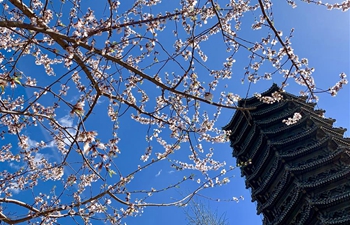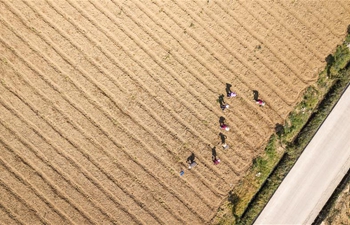WASHINGTON, March 21 (Xinhua) -- Chinese paleontologists have discovered a trove of well-preserved fossils in China 518 million years ago, representing more than 50 previously undescribed animal species, including jellyfish, arthropods and algae.
The study published on Thursday in the journal Science showed that this new fossil assemblage with a high abundance and diversity of species might rival previously described Cambrian sites like the Burgess Shale in Canada and Chengjiang localities in southwest China.
The newly-found fossils have the potential to greatly inform the understanding of early animal evolution, according to the study.
Researchers from China's Northwest University in Xi'an have collected 4,351 specimens at the site in central China's Hubei Province, representing 101 different taxa. The new fossil trove is called the Qingjiang biota.
About 542 million years ago, life on earth diversified at extremely rapid speed, which is known as the Cambrian explosion. Almost all present animal phyla appeared at that time.
Unlike other Cambrian fossil troves, the Qingjiang biota appears to contain a high proportion of jellyfish and comb jellies, which are are extremely rare at other sites, according to the study.
"Compared with Chengjiang biota living in the shallow water along the coast, Qingjiang biota lives in deep ocean, making the two biota complementary to each other in their scientific significance," the paper's co-author Zhang Xingliang, a paleontologist at Northwest University, told Xinhua.
Also, the marine fossils of Chengjiang biota experienced no strong weathering, making those life forms well-preserved so that they could become better material for scientific study than previously uncovered specimens.
"The treasure trove of the Qingjiang biota provides an exciting opportunity to explore how paleoenvironmental conditions influenced ecological structuring and evolutionary drivers during the Cambrian Explosion," said Allison Daley, a paleontologist at the University of Lausanne in Switzerland who was not involved in the study.

















